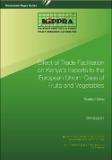Discussion Paper No. 193 of 2017 on Effect of Trade Facilitation on Kenya's Exports to the European Union: Case of Fruits and Vegetables
View/
Publication Date
2017Author
Type
KIPPRA Publicationsviews
downloads
Metadata
Show full item recordBy
Owino, Boniface
Abstract/
The objective of this study was to estimate the effects of trade facilitation on Kenya’s fruits and vegetables exports to the European Union using an augmented gravity model. The trade effect of improving trade facilitation in Kenya to the level of its major competitors in the EU was also estimated. The study found a positive and statistically significant relationship between exports of fruits and vegetables and customs efficiency, importer regulatory efficiency, exporter regulatory efficiency, ICT use, and quality of air transport infrastructure index. This means that trade facilitation with respect to these variables has a positive effect on exports. Additionally, production volume and lagged importer GDP per capita have a positive effect on exports of fruits and vegetables. However, a depreciation of the Kenya shilling against the US dollar and an increase in Kenya’s GDP per capita reduce exports. Improving Kenya’s ICT use and customs efficiency index to the level of Costa Rica would positively affect exports of fruits and vegetables. Similarly, improving Kenya’s regulatory efficiency and quality of air transport infrastructure index to the level of Morocco would have a positive effect on exports. In light of these findings, the study recommends implementation of trade facilitation measures geared towards improving customs efficiency, regulatory efficiency, air transport infrastructure, and ICT use to reduce trade costs and improve exports.
Publisher
The Kenya Institute for Public Policy Research and Analysis (KIPPRA)Series
DP/193/2017;Collections
- Discussion Papers [327]

